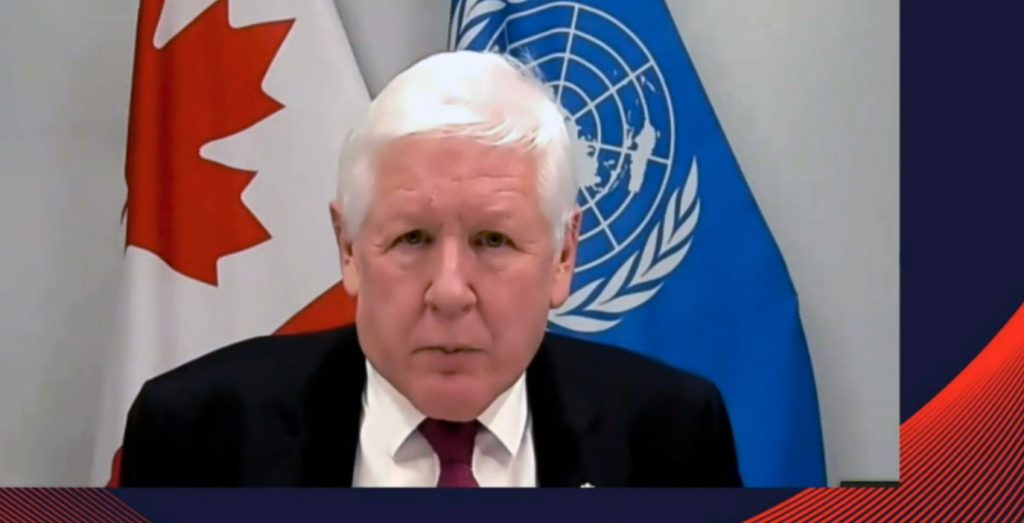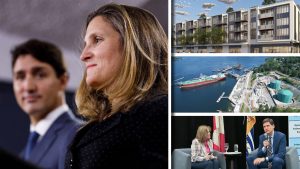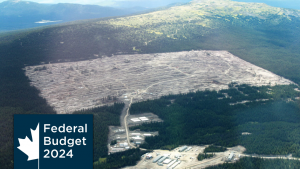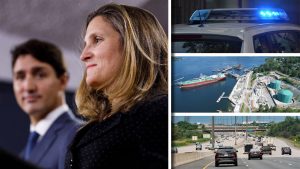Canada’s Ambassador to the United Nations Bob Rae told delegates tuned in to the recent Canadian Council for Public-Private Partnerships conference that the world is facing a reckoning, with two twin crises requiring significant and immediate action from both the public and private sectors.
“Everybody will agree the two biggest challenges we face globally are COVID-19 and its lingering impacts, combined with climate change, which is challenging the very notion of sustainability and pushing the planet to the very limits of what it can sustain,” said Rae during his keynote address to the online conference on its second day, Nov. 18.
The globe is slowly but surely coming to grips with the implications of the crises, suggested the former premier of Ontario, with concerns they are increasingly contributing to global insecurity and threatening to lead to global conflicts.
“Every global crisis requires a global solution,” said Rae, addressing climate change. “And I don’t think there’s any doubt at all that we are going to see the need for an unprecedented level of international investment on infrastructure that will help us deal with climate change.
“This question of mitigation, which requires an unprecedented amount of investment in retooling, in re-equipping, in renewing industries, seeing globally how we can do this and seeing globally how it can be done.
“It is an exciting time to be in the business you are in.”
Rae addressed the urgency of the climate change issue by saying, “If we don’t start yesterday, we are not going to get close to the targets we set for 2050.
“The simple fact is, governments can’t do it alone. There will inevitably be a process by which governments, after this extraordinary period of public spending, far and away beyond what anyone would have anticipated a year ago, there will have to be a sense of there are limits.”
Governments are scraping by, he said, “but we can’t have success without the private sector. We can’t succeed without pension funds, we can’t have success without partnerships between private capital and government in order to achieve what we need to achieve.”
The infrastructure sector has to be more courageous on the global stage, Rae argued. Many delegates are in the business of assessing risk, he said, but given the global needs for infrastructure of many types, they have to start thinking of opportunities in addition to risks.
And that is where governments can play another role, he said.
“Governments have to be there to derisk the investment, both globally and locally,” said Rae. “To encourage the private sector to engage in ways that need to happen. It is not a matter of guaranteeing returns but it is a matter of saying, what more can we do in co-operation with other governments to make sure that the framework for investment is positive and is constructive and is going to make for a better future.”
Around the world, investors are seizing the opportunity to profit by addressing the global infrastructure gap, Rae said, currently estimated at $90 trillion dollars. China with its Belt and Road initiative is now established as an infrastructure player in dozens of countries. So there is a huge opening for the Canadian infrastructure sector, he argued.
“It is important for us to be part of this challenging global framework that is going to make a huge difference in the lives of people in the world,” Rae said.
It was during Rae’s term as premier of Ontario from 1990 to 1995 that one of the world’s largest P3 projects up to that time, the 407 toll highway in the Toronto region, was launched. Rae said he supported the recruitment of private sector expertise and investment because of the size of the project. The Team Canada approach proved to be a model that later P3 projects would follow.
The 407 later became controversial for another reason, when the expressway was sold to private interests. But overall the project showed that private and public sectors working together could make an enormous difference, said Rae.
“It made me believe in the possibility of P3s,” he said. “It is a story we need to continue to tell.”
In the near term, however, global economists are saying the world economy might not return to pre-pandemic levels until 2023 — Rae quoted from a conversation he recently had with International Monetary Fund managing director Kristalina Georgieva on the point.
“It is very difficult to create the necessary solidarity for people to understand that this is a global crisis,” he remarked.
Follow the author on Twitter @DonWall_DCN.











Recent Comments
comments for this post are closed